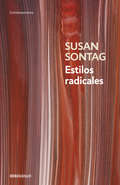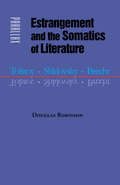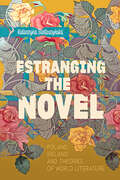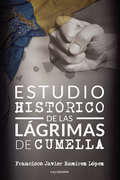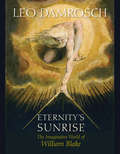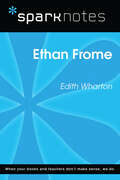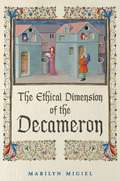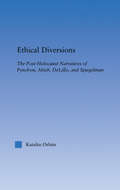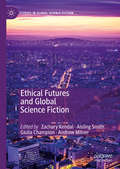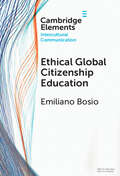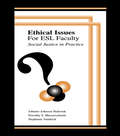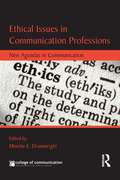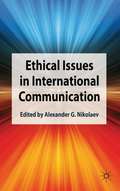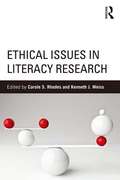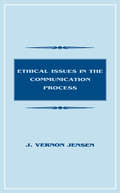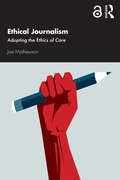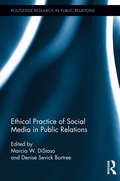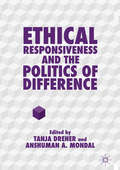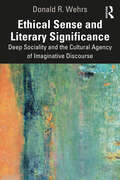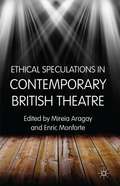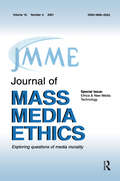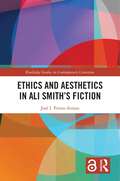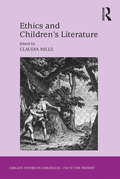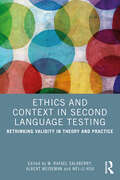- Table View
- List View
Estilos radicales (Alfaguara/bolsillo Ser.)
by Susan SontagLos ocho ensayos incluidos en este libro son una portentosa muestra de la pluralidad filosófica de Susan Sontag. Estilos radicales (1969), la segunda colección de ensayos de Susan Sontag, extiende las investigaciones apuntadas en Contra la interpretación a nuevas consideraciones sobre el cine Bergman y Godard, la literatura Cioran, la política la guerra de Vietnam y un magnífico estudio sobre la pornografía, «La imaginación pornográfica», por mencionar algunos de los ocho ensayos certeros que contiene este volumen. Reseña:«Susan Sontag es uno de los críticos más valiosos e interesantes que tenemos, una escritora de la que es posible aprender continuamente.»Richard Gilman, The New Republic
Estrangement and the Somatics of Literature: Tolstoy, Shklovsky, Brecht (Parallax: Re-visions of Culture and Society)
by Douglas RobinsonDrawing together the estrangement theories of Viktor Shklovsky and Bertolt Brecht with Leo Tolstoy's theory of infection, Douglas Robinson studies the ways in which shared evaluative affect regulates both literary familiarity—convention and tradition—and modern strategies of alienation, depersonalization, and malaise.This book begins with two assumptions, both taken from Tolstoy's late aesthetic treatise What Is Art? (1898): that there is a malaise in culture, and that literature's power to "infect" readers with the moral values of the author is a possible cure for this malaise. Exploring these ideas of estrangement within the contexts of earlier, contemporary, and later critical theory, Robinson argues that Shklovsky and Brecht follow Tolstoy in their efforts to fight depersonalization by imbuing readers with the transformative guidance of collectivized feeling. Robinson's somatic approach to literature offers a powerful alternative to depersonalizing structuralist and poststructuralist theorization without simply retreating into conservative rejection and reaction.Both a comparative study of Russian and German literary-theoretical history and an insightful examination of the somatics of literature, this groundbreaking work provides a deeper understanding of how literature affects the reader and offers a new perspective on present-day problems in poststructuralist approaches to the human condition.
Estranging the Novel: Poland, Ireland, and Theories of World Literature
by Katarzyna BartoszyńskaTo develop a theory of world literature, this book demands that the theory of the novel can no longer ignore literary forms other than realism.For centuries, the standard account of the development of the novel focused on the rise of realism in English literature. Studies of early novels connected the form to various aspects of British life across the eighteenth and nineteenth centuries, including the burgeoning middle class, the growth of individualism, and the emergence of democracy and the nation-state. But as the push for teaching and learning global literature grows, this narrative is insufficient for studying novel forms outside of a predominately English-speaking British and American realm.In Estranging the Novel, Katarzyna Bartoszyńska explores how the emergence and growth of world literature studies has challenged the centrality of British fiction to theories of the novel's rise. She argues that a historicist approach frequently reinforces the realist paradigm that has cast other traditions as "minor," conceding a normative vision of the novel as it seeks to explain why historical forces produced different forms elsewhere. Recasting the standard narrative by looking at different novelistic literary forms, including the Gothic, travel writing, and queer fiction, Bartoszyńska offers a compelling comparative study of Polish and Irish works published across the long nineteenth century that emphasize fictionality, or the problem of world-building in literature.Reading works by Ignacy Krasicki, Jan Potocki, Narcyza Żmichowska, and Witold Gombrowicz alongside others by Jonathan Swift, Charles Maturin, Oscar Wilde, and Samuel Beckett, Bartoszyńska shows that the history of the novel's rise demands a more capacious and rigorous approach to form as well as a reconceptualization of the relationship between fiction and its cultural contexts. By modeling such a heterogeneous account of the novel form, Estranging the Novel paves the way for a bracing and diverse understanding of the makeup of contemporary world literature and the many texts it encompasses—and a new perspective on the British novel as well.
Estudio histórico de las lágrimas de Cumella
by Francisco Javier Ramírez LópezUn hombre que jugó a ser cacique, ¿quieres saber cómo? La historia de Canarias está repleta de personajes relevantes que marcaron nuestro devenir. Juan Cumella fue uno de ellos, y Benito Pérez Armas quiso mostrarnos el lado humano de este empresario catalán afincado en nuestro archipiélago, que representó también una característica de nuestra historia contemporánea: el caciquismo. Lo cual hace de esta una obra de consulta complementaria para elalumnado de 2.º de Bachillerato.
Et Cetera, Et Cetera: Notes of a Word-Watcher
by Lewis ThomasA philologist's gold mine! Thomas recounts the history of the usage of words as well as the etymology of English words. The Latin, Greek and Sanskrit roots are accurate. (Note to parents: this book does cover some words which you might not want your youth to read without your supervision.) Index of English words (back of book) provides a fine resource for students. A funny, informative and creative look at words. A fascinating read.
Eternity's Sunrise
by Leo DamroschWilliam Blake, overlooked in his time, remains an enigmatic figure to contemporary readers despite his near canonical status. Out of a wounding sense of alienation and dividedness he created a profoundly original symbolic language, in which words and images unite in a unique interpretation of self and society. He was a counterculture prophet whose art still challenges us to think afresh about almost every aspect of experience--social, political, philosophical, religious, erotic, and aesthetic. He believed that we live in the midst of Eternity here and now, and that if we could open our consciousness to the fullness of being, it would be like experiencing a sunrise that never ends. Following Blake's life from beginning to end, acclaimed biographer Leo Damrosch draws extensively on Blake's poems, his paintings, and his etchings and engravings to offer this generously illustrated account of Blake the man and his vision of our world. The author's goal is to inspire the reader with the passion he has for his subject, achieving the imaginative response that Blake himself sought to excite. The book is an invitation to understanding and enjoyment, an invitation to appreciate Blake's imaginative world and, in so doing, to open the doors of our perception.
Ethan Frome (SparkNotes Literature Guide Series)
by SparkNotesEthan Frome (SparkNotes Literature Guide) by Edith Wharton Making the reading experience fun! Created by Harvard students for students everywhere, SparkNotes is a new breed of study guide: smarter, better, faster.Geared to what today's students need to know, SparkNotes provides:chapter-by-chapter analysis explanations of key themes, motifs, and symbols a review quiz and essay topics Lively and accessible, these guides are perfect for late-night studying and writing papers.
Ethical Dimension of the 'Decameron'
by Marilyn MigielWith The Ethical Dimension of the "Decameron" Marilyn Migiel, author of A Rhetoric of the "Decameron" (winner of the MLA's 2004 Marraro Prize), returns to Giovanni Boccaccio's masterpiece, this time to focus on the dialogue about ethical choices that the Decameron creates with us and that we, as individuals and as groups, create with the Decameron.Maintaining that we can examine this dialogue to gain insights into our values, our biases and our decision-making processes, Migiel offers a view of the Decameron as sticky and thorny. According to Migiel, the Decameron catches us as we move through it, obligating us to reveal ourselves, inviting us to reflect on how we form our assessments, and calling upon us to be mindful of our responsibility to judge patiently and carefully. Migiel's focus remains unabashedly on the experience of readers, on the meanings they find in the Decameron, and on the ideological assumptions they have about the way that a literary text such as the Decameron works. She offers that, rather than thinking about the Decameron as "teaching" readers, we should think about it "testing" them.Throughout, Migiel engages in the masterful in-depth rhetorical analyses, delivered in lively and readable prose, that are her trademark. Whether she is examining the Italian of the Decameron, translations of the Italian into English, commentaries by scholars, newspaper articles, or student essays, she asks us always to maintain an ethical engagement with the words of others.
Ethical Diversions: The Post-Holocaust Narratives of Pynchon, Abish, DeLillo, and Spiegelman (Literary Criticism and Cultural Theory)
by Katalin OrbanFirst Published in 2005. Routledge is an imprint of Taylor & Francis, an informa company.
Ethical Futures and Global Science Fiction (Studies in Global Science Fiction)
by Zachary Kendal Aisling Smith Giulia Champion Andrew MilnerEthical Futures and Global Science Fiction explores the ethical concerns and dimensions of representations of the future of global science fiction, focusing on the issues that dominate utopian, dystopian and science fiction literature. The essays examine recent visions of the future in science fiction and re-examine earlier texts through contemporary lenses. Across fourteen chapters, the collection considers authors from Algeria, Australia, Canada, China, Egypt, France, Germany, Haiti, India, Jamaica, Macedonia, Mexico, Russia, South Africa, the UK and USA. The volume delves into a range of ethical questions of immediate contemporary relevance, including environmental ethics, postcolonial ethics, social justice, animal ethics and the ethics of alterity.
Ethical Global Citizenship Education (Elements in Intercultural Communication)
by Emiliano T. BosioGlobal Citizenship Education (GCE) plays a central role within UNESCO's education sector, focusing on cultivating the values and knowledge essential for students to evolve into well-informed and responsible global citizens. This Element conceptualises an ethical GCE framework grounded in critical, cosmopolitan, humanistic, value-creating, and transformative principles. Guided by those principles, ethical GCE goes beyond the banking model of education by emphasising a global ethic. Ethical GCE is inclusive, ethically reflective, and socially responsible. It extends beyond imparting knowledge and employable skills, important as they are, focusing on holistic and sustainable development. With further theoretical development and implementation strategies, the ethical GCE framework holds promise for future research and evaluation of the intricate teaching and learning processes within global citizenship, particularly from a values-based perspective.
Ethical Issues for Esl Faculty: Social Justice in Practice
by Johnnie Johnson Hafernik Stephanie Vandrick Dorothy S. MesserschmittThis book explicitly addresses ethical dilemmas and issues that post-secondary ESL faculty commonly encounter and examines them in the framework of social justice concerns. Ethics is defined broadly, to include responsibilities and obligations to students inside and outside the classroom, as well to colleagues, educational institutions, the TESL profession, and society as a whole. Scenarios in each chapter provide realistic and compelling situations for reflection and discussion. The authors then set out the issues raised, relate them to the classroom environment, and offer opportunities to examine them in a variety of contexts and to consider possible solutions to the dilemmas. Issues include testing, plagiarism, technology, social and political issues affecting students and the classroom, gift-giving, curriculum decisions, disruptive students, institutional constraints, academic freedom, gender, class, and power. Busy classroom instructors will find this book accessible, thought-provoking, and relevant to their daily work situations. It is not intended as a theoretical treatment of ethics and social justice in ESL, nor does it propose that ESL faculty teach morals or ethics to students. Rather, it is designed as a concise, practical introduction to ethical practice for both new and experienced ESL faculty in post-secondary teaching situations in the United States, for others interested in the ESL classroom, and as a text for TESL classes and seminars. Ethical Issues for ESL Faculty: *maps new territory in the field--ethical issues in TESL, particularly as encountered by post-secondary classroom teachers, are not often discussed in ESL publications; *makes the complex issues of ethics in the context of social justice accessible to TESL practitioners; and *includes useful resources, such as additional scenarios for discussion, an extensive reference list, and selected ethics-related Web sites.
Ethical Issues in Communication Professions: New Agendas in Communication (New Agendas in Communication Series)
by Minette E. DrumwrightDynamic, rapid, and radical changes are transforming the communication professions, provoking major implications for ethics. Traditional boundaries blur as media converge; relentless competitive pressures cause some forms of communication to atrophy and permit others to explode; and technological advances occur daily. In this volume, a new generation of scholars take a fresh look at the manner in which ethical issues manifest themselves in their areas of research and suggest new agendas for future research. This book addresses a wide range of questions from a variety of communication professions. Contributors tackle such issues as how to define a journalist in an era when anyone can disseminate information to a global audience; how to use "advergames," crowdsourcing, and facial recognition technology in advertising responsibly; and how to respond ethically in situations of public crisis communication, among many others. This volume will be critical reading for scholars and professionals in media, communication, and digital arts, as well as philosophy, government, public policy, business, and law.
Ethical Issues in International Communication
by Alexander G. NikolaevThisunique collectionexplores contemporary ethical issues and problems in international communication. Written by scholars from around the world focusing on global ethical issues for a global audience, the volume considers theoretical issues of international communication ethics and provides specific practical examples and case studies. Key areas within the field of international communication are discussed, includingjournalism, international PR and public communication, political rhetoric andeducation, making this an important inclusion to the current literature. "
Ethical Issues in Literacy Research
by Carole S. Rhodes Kenneth J. WeissLiteracy educators and researchers at all stages of their careers face ethical issues whenever they embark on research studies. In this book experienced literacy researchers identify and address multi-faceted, multi-dimensional ethical issues related to conducting studies in school, home, community, and virtual settings and share actions taken when faced with ethical dilemmas in their own investigations. Each chapter addresses a specific literacy research ethical issue. Part I focuses on conducting research in settings such as schools or literacy clinics. Part Two addresses research with pre-service teachers in college/university and school settings. Part Three looks at research in virtual worlds and online environments. Pedagogical features in each chapter engage readers in making connections between what they are reading and their own teaching and learning situations: A vignette to help readers understand the issue; pre-reading questions ; background information drawn from current research literature; suggested engagement activities; chapter summary. Additional resources (PowerPoint Presentations; Case Studies; Website Links; Interactive "Ask the Researcher Websites/Blogs/Tweets") are available on a website linked to the book: www.LiteracyResearchEthics.com
Ethical Issues in the Communication Process (Routledge Communication Series)
by J. Vernon JensenA rapid and widespread growth of interest in applied ethics is occurring today not only in the United States, but around the world as well. Academia both reflects this and is a leader in the movement. The field of speech communication shares in this increased sensitivity to ethical concerns. Students and the general public are looking for thoughtful analyses and guidance in all areas of communication. Ethical concerns relative to mass communication have been the subject of a number of books, but only a very few cover the entire scope of communication to include interpersonal, intercultural, organizational, small groups, and public speaking. This book tries to fill that need by discussing ethical concerns as they emerge in the areas of the communication process -- the communicator, the message, the media, the audience, and the situation. The speech communication field now has a need to digest and synthesize the existing research findings and the general literature in the field and in related humanities and social science works into a coherent and nontechnical discussion. This volume explores the most up-to-date materials to provide just such a synthesis. An extensive bibliography at the end of the book gives readers the sources on which the book is based, and offers ample avenues for further personal exploration. The book should provide meaningful food for thought as readers grapple conscientiously with the many everyday decisions made in communication transactions, and in evaluating the communication of others.
Ethical Journalism: Adopting the Ethics of Care
by Joe MathewsonThis book makes the case for the news media to take the lead in combatting key threats to American society including racial injustice, economic disparity, and climate change by adopting an "ethics of care" in reporting practices. Examining how traditional news coverage of race, economics and climate change has been dedicated to straightforward facts, the author asserts that journalism should now respond to societal needs by adopting a moral philosophy of the "ethics of care," opening the door to empathetic yet factual and fair coverage of news events, with a goal to move public opinion to the point that politicians are persuaded to take effective action. The book charts a clear path for how this style of ethics can be applied by today’s journalists, tracing the emergence of this empathy-based ethics from feminist philosophy in the 1980s. It ultimately urges ethical news organizations to adopt the ethics of care, based on the human emotion prioritized by Scottish Enlightenment philosopher David Hume, and to pursue a more pro-active, solutions-seeking coverage of current events. This is an invaluable text for students and academics in the fields of journalism ethics, media ethics and media law, as well as for media professionals looking for a fresh perspective on practicing ethical journalism.
Ethical Practice of Social Media in Public Relations (Routledge Research in Public Relations)
by Marcia W. DiStaso Denise Sevick BortreeGiven the high rate of social media use by the public, organizations are compelled to engage with key audiences through these outlets. Social media engagement requires organizations to actively participate with public groups, and this highly-interactive exchange raises a new set of ethical concerns for communicators. In this rapidly changing communications environment, the long-term implications of social media are uncertain, and this book provides the much needed research to understand its impact on audiences and organizations. Through an examination of a broad range of ethics concepts including transparency and online identities, policies, corporate responsibility, and measurement, this book explores a variety of topics important to public relations such as diversity, non-profit communication, health communication, financial communication, public affairs, entertainment communication, environmental communication, crisis communication, and non-profit communication. The chapter authors, expert scholars within their fields of public relations, offer insights drawn from original research and case study examples of ethical dilemmas raised by social media communication.
Ethical Responsiveness and the Politics of Difference
by Anshuman A. Mondal Tanja DreherThis edited collection focuses on the ethics, politics and practices of responsiveness in the context of racism, inequality, difference and controversy. The politics of difference has long been concerned with speech, voice and representation. By focusing on the practices and politics of responsiveness—listening, reading and witnessing—the volume identifies vital new possibilities for ethics and social justice. Chapters focus on the conditions of possibility, or listening as ethical praxis; unsettling or disrupting colonial relationships; and ways of listening that highlight non-Western traditions and move beyond the liberal frame. Ethical responsiveness shifts some of the responsibility for negotiating difference and more just futures from subordinated speakers, and on to the relatively more privileged and powerful.
Ethical Sense and Literary Significance: Deep Sociality and the Cultural Agency of Imaginative Discourse
by Donald R. WehrsThis study blends together ethical philosophy, neurocognitive-evolutionary studies, and literary theory to explore how imaginative discourse addresses a distinctively human deep sociality, and by doing so helps shape cultural and literary history. Deep sociality, arising from an improbable evolutionary history, both entwines and leaves non-reconciled what is felt to be significant for us and what ethical sense seems to call us to acknowledge as significant, independent of ourselves. Ethical Sense and Literary Significance connects literary and cultural history without reducing the literary to a mere expression of something else. It argues that affective differences between non-egocentric and egocentric registers of significance are integral to the bioculturally evolved deep sociality that verbal art addresses—often in unsettling and socially critical ways. Much imaginative discourse, in early societies as well as recent ones, brings ethical sense and literary significance together in ways that reveal their intricate but non-harmonized internal entwinement. Drawing on contemporary scholarship in the humanities and sciences, Donald R. Wehrs explores the implications of interdisciplinary approaches to topics central to a wide range of fields beyond literary studies, including neuroscience, anthropology, phenomenological philosophy, comparative history, and social psychology.
Ethical Speculations in Contemporary British Theatre
by Mireia Aragay Enric MonforteThis volume is the first to offer a comprehensive critical examination of the intersections between contemporary ethical thought and post-1989 British playwriting. Its coverage of a large number of plays and playwrights, international range of contributors and original argumentation make it a key point of reference for students and researchers.
Ethics & New Media Technology: A Special Issue of the journal of Mass Media Ethics
by Lawrence ErlbaumThis special issue shows that "old ethics" don't always provide ready answers to problems raised by new technology. Exploring the perplexing topic of ethics in new media, this special issue: *examines the ethics of the highly controversial 1998 Cincinnati Enquirer exposé of Chiquita Brands International; *reports on a pilot project involving online journalists and online journalism graduate students; *investigates the extent to which e-mail and listservs are--and could be--effective fora for journalists interested in exploring matters of ethics; and *provides a useful annotated webliography of information resources.
Ethics and Aesthetics in Ali Smith’s Fiction (Routledge Studies in Contemporary Literature)
by José I. Prieto-ArranzThis study offers a fresh perspective on Ali Smith’s work, analysing her fiction through a truly interdisciplinary lens. José I. Prieto-Arranz explores Smith’s engagement with contemporary issues such as digital violence, disinformation, pornography, nationalism, climate change, discrimination, and social fracture. Simultaneously, this book examines Smith’s unique stylistic choices, including her use of magical realism, intertextuality, and intermediality, to reveal the intricate connection between the ethical and aesthetic dimensions of her novels. Through close readings of Smith’s novels, from Like to Companion Piece, enriched with insights from her prolific short fiction, the author demonstrates how Smith constructs a “text continuum,” revealing recurrent themes and stylistic choices that underline her firm belief in the transformative power of fiction and, by extension, art. This book will appeal to scholars of contemporary literature, art theory, political science, sociology and cultural studies, and anyone interested in literature and social commentary.
Ethics and Children's Literature (Studies in Childhood, 1700 to the Present)
by Claudia MillsExploring the ethical questions posed by, in, and about children’s literature, this collection examines the way texts intended for children raise questions of value, depict the moral development of their characters, and call into attention shared moral presuppositions. The essays in Part I look at various past attempts at conveying moral messages to children and interrogate their underlying assumptions. What visions of childhood were conveyed by explicit attempts to cultivate specific virtues in children? What unstated cultural assumptions were expressed by growing resistance to didacticism? How should we prepare children to respond to racism in their books and in their society? Part II takes up the ethical orientations of various classic and contemporary texts, including 'prosaic ethics' in the Hundred Acre Wood, moral discernment in Narnia, ethical recognition in the distant worlds traversed by L’Engle, and virtuous transgression in recent Anglo-American children’s literature and in the emerging children’s literature of 1960s Taiwan. Part III’s essays engage in ethical criticism of arguably problematic messages about our relationship to nonhuman animals, about war, and about prejudice. The final section considers how we respond to children’s literature with ethically focused essays exploring a range of ways in which child readers and adult authorities react to children’s literature. Even as children’s literature has evolved in opposition to its origins in didactic Sunday school tracts and moralizing fables, authors, parents, librarians, and scholars remain sensitive to the values conveyed to children through the texts they choose to share with them.
Ethics and Context in Second Language Testing: Rethinking Validity in Theory and Practice
by Albert Weideman M. Rafael Salaberry Wei-Li HsuThis innovative, timely text introduces the theory and research of critical approaches to language assessment, foregrounding ethical and socially contextualized concerns in language testing and language test validation in today’s globalized world. The editors bring together diverse perspectives, qualitative and quantitative methodologies, and empirical work on this subject that speak to concerns about social justice and equity in language education, from languages and contexts around the world – offering an overview of key concepts and theoretical issues and field-advancing suggestions for research projects. This book offers a fresh perspective on language testing that will be an invaluable resource for advanced students and researchers of applied linguistics, sociolinguistics, language policy, education, and related fields – as well as language program administrators.
